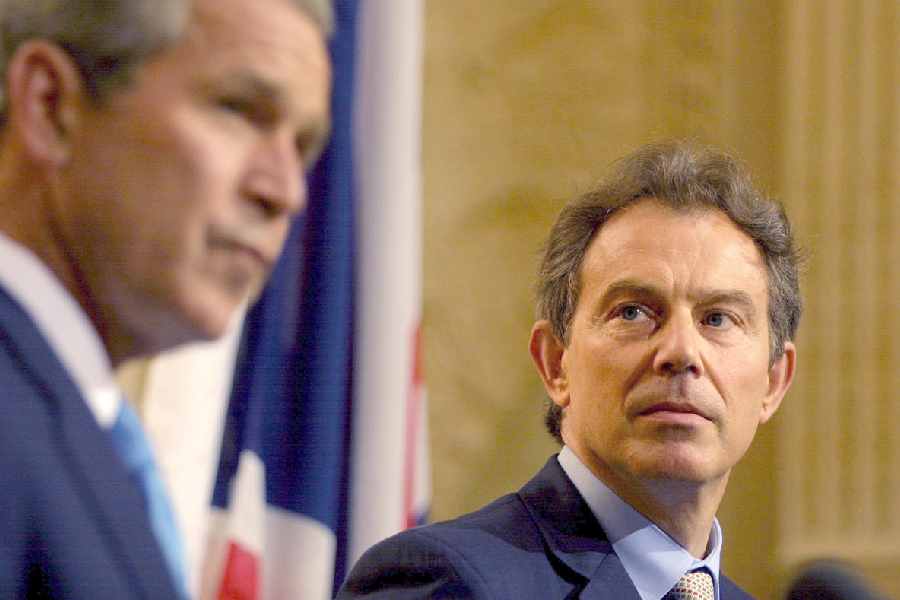A fortnight ago, Kishore Mahbubani wrote a column in the Financial Times where he argued that the United Kingdom should cede its veto in the United Nations Security Council to India. Mahbubani, a Singaporean diplomat who served a term as the president of the Security Council, has made an intellectual career out of teasing out the ways in which a hegemonic US-led West should rationally come to terms with Asia’s ascendant powers.
The main lesson of Mahbubani’s article wasn’t India’s claim to a permanent seat on the Security Council; it was the extent to which the UK had ceased to be an autonomous actor on the world stage. As Mahbubani pointed out, for more than thirty-five years now, the UK hasn’t exercised its veto, preferring to abstain, because its foreign policy has marched in lockstep with that of the United States of America. The US veto, even when wielded alone, is a kind of chorus, with the UK in the background miming ‘No’.
That the UK embraces its status as a client state has been obvious since Tony Blair swore fealty to George Bush in the run-up to the invasion of Iraq, writing “I’ll be with you, whatever.” Blair, like many British prime ministers both before him and since, chose to believe that Britain’s role was to tutor in the ways of empire a powerful but unsophisticated hegemon, the US, to play, in Harold Macmillan’s words, the Greeks to their Romans.
This was, of course, a delusion, because George Bush took his advice from Donald Rumsfeld and Dick Cheney and saw Blair and the leaders of the nations that made up the Coalition of the Willing as America’s creatures, but it served (and continues to serve) a useful purpose. It allowed British prime ministers a respectable explanation for their slavishness. The idea that it was post-imperial Britain’s historic destiny to act in concert with America to maintain the world order allowed Britain to subcontract its foreign policy out to the leader of the Free World.
The most recent example of this peculiar abdication of sovereignty is Britain’s equivocation on a ceasefire in Gaza and the attitude of its two principal parties towards the genocidal violence inflicted on the Palestinians in that beleaguered strip of land. The stated position of the leadership of the Conservative and Labour parties is that any deviation from the US position on the ceasefire or the recognition of Palestine as a state would distract from the US-led negotiations and endanger the prospect of peace.
When advocates of a ceasefire urged the British government to suspend arms sales to Israel, the response of both parties was that Britain’s arms sales to Israel were so small that an embargo would make no difference to the conflict. Given that Joe Biden’s administration has refused to use the leverage available to force Israel to end a conflict that has led to 40,000 Palestinian deaths, waiting on US action has left Britain potentially complicit in genocide.
It is not as if it is impossible for America’s European allies to differ from it on important geopolitical issues. On the matter of recognising Palestine as a state, Spain has diverged from the US. Spain is a NATO ally; it has, despite that, staked out its own position on Israel/Palestine. Ireland, which has a very special relationship with Irish-American politicians like Joe Biden, has chosen to recognise Palestine as a state and been trenchantly critical of Israel’s savagery in Gaza. In Britain, on the other hand, the Speaker of the House of Commons broke parliamentary convention to spare the Labour Party the embarrassment of voting on a Scottish National Party motion
for an unequivocal ceasefire. The leaders of the Conservative Party and the Labour Party agreed on one thing: Britain had to follow America’s lead on Gaza.
The strangest thing about this position is that it is held not only by British politicians but also by Britain’s pundit class. It’s one thing for British politicians to believe in their ‘special relationship’ with their counterparts in America; it’s quite another for commentators to suspend moral and ethical judgment. Liberal commentators criticised peace demonstrators for pressing MPs on a matter over which Britain had so little leverage. Muslim voters were described as ‘sectarian’ for making Gaza an issue in Britain’s electoral politics. Commentators who had denounced Hamas’s savagery on October 7 in the strongest terms were oddly mealymouthed about Israel’s genocidal bombardment.
Liberal commentators like Sam Leith and Marina Hyde twisted themselves into pretzel shapes to say as little as possible about the mass killing of Palestinians. Hyde was more concerned about the safety of British MPs being pressed or abused by ceasefire activists than she was about the genocidal violence against Palestinians in Gaza. Leith wrote a whole column about the virtue of saying nothing about issues like Gaza because they were “triggering”. Hyde and Leith weren’t exceptional; the entire British media establishment, apart from a few outliers like Bruno Maçães in the New Statesman or Owen Jones in The Guardian, nominated Joe Biden and Antony Blinken as their proxies on Gaza. Gideon Rachman used up a whole column arguing that Biden’s embrace of Benjamin Netanyahu was misunderstood by liberal critics because “… the best chance of preventing a humanitarian catastrophe in Gaza is to support Israel.” That didn’t wear well.
The larger point here is that America’s clients in the Anglosphere have willingly traded in geopolitical sovereignty and intellectual independence for America’s protection. This Coalition of the Willing, which has signed up for every fight that America has picked in the name of freedom, lives vicariously, by treating America’s sinews as its own. The Anglosphere is not to be confused with the West: it consists of Britain and its English-speaking, white settler colonies that grew into nations. France and Germany, countries integral to NATO and the West, disagreed with the US about the invasion of Iraq at some considerable cost to themselves. Such fundamental disagreement is inconceivable within the establishments of the Anglosphere.
The costs of bartering sovereignty for influence are a subject best left to specialists in international relations. For the rest of us, the more pressing lesson is the way in which discourse itself is debauched by such deference. The willingness of British commentators to suspend judgment because this matter or that was above their country’s pay grade or arsenal or negotiating capacity and, therefore, best left to the adults in America is a kind of intellectual corruption. The UK shouldn’t have the veto because a country that subcontracts its geopolitical thinking to a more powerful nation isn’t a player, it’s a cautionary tale.
mukulkesavan@hotmail.com











